General
First Makerere Workshop on Social Systems & Computation
Published
15 years agoon
Summary Top researchers from Northwestern University (Chicago), University of British Columbia (Vancouver) and Makerere (Kampala) are teaming up to offer a workshop on cutting-edge methods for computational modeling of social systems, algorithm design, and machine learning. The sessions will take place between December 3rd and 10th, and there is no cost for attendance; however, registration is mandatory.
Summary Top researchers from Northwestern University (Chicago), University of British Columbia (Vancouver) and Makerere (Kampala) are teaming up to offer a workshop on cutting-edge methods for computational modeling of social systems, algorithm design, and machine learning. The sessions will take place between December 3rd and 10th, and there is no cost for attendance; however, registration is mandatory.
Attendance is limited to academic staff working at a Ugandan university; students doing research in related areas may also be given special permission to attend if space permits. Participants will have the opportunity to publish papers in official, reviewed workshop proceedings at a later date. A certificate of completion will be provided to participants who attend at least two thirds of workshop sessions.
Overview Traditionally, computer science has viewed data as coming from either an adversarial source or from nature itself, giving rise to worst-case and average-case design and analysis of optimization algorithms. In recent years with the advent of modern technologies like the Internet, it has become increasingly apparent that neither of these assumptions reflects reality. Data is neither adversarial nor average, but rather inputs to algorithms are constructed by a diverse set of self-interested agents in an economy, all aiming to maximize their own happiness. Thus the raw data is often not available to an algorithm designer, but must be solicited from the agents–that is, the designer faces an economic constraint. The primary goal of this workshop is to explore the implications of this observation. We will study the performance of algorithms in the presence of utility-maximizing agents and ask whether alternate designs might create incentives for agents to act more optimally. Simultaneously, we will look at other more traditional optimization problems such as approximation and learning and techniques to solve them, pointing out that these may often be leveraged to solve issues in the economic setting.
Related Research Areas Computer Science Theory; Artificial Intelligence; Economics; Business
Format The workshop will consist of six 3-hour lectures, plus meal/breakout sessions for informal research discussion. Spaces are strictly limited, and attendees must pre-register. We will aim to select topics and session times that are best for our participants. To register, and to indicate your preferences for topics and dates, please complete the survey at http://www.surveymonkey.com/s/WWGMKZG.
List of Candidate Topics The workshop will consist of up to six of the following twelve topics.
Introduction to Game Theory
Game theory is the mathematical study of interaction among independent, self-interested agents. It has been applied to disciplines as diverse as economics, political science, biology, psychology, linguistics—and computer science. This tutorial will introduce what has become the dominant branch of game theory, called noncooperative game theory, and will specifically describe normal-form games, a canonical representation in this discipline. The tutorial will be motivated by the question: "In a strategic interaction, what joint outcomes make sense?"
Voting Theory
Voting (or "Social Choice") theory adopts a“designer perspective” to multiagent systems, asking what rules should be put in place by the authority (the “designer”) orchestrating a set of agents. Specifically, how should a central authority pool the preferences of different agents so as to best reflect the wishes of the population as a whole? (Contrast this with Game Theory, whichadopts what might be called the “agent perspective”: its focus is on making statements about how agents should or would act in a given situation.) This tutorial will describe famous voting rules, show problems with them, and explain Arrow's famous impossibility result.
Mechanism Design and Auctions
Social choice theory is nonstrategic: it takes the preferences of agents as given, and investigates ways in which they can be aggregated. But of course those preferences are usually not known. Instead, agents must be asked to declare them, which they may do dishonestly. Since as a designer you wish to find an optimal outcome with respect to the agents’ true preferences (e.g., electing a leader that truly reflects the agents’ preferences), optimizing with respect to the declared preferences will not in general achieve the objective. This tutorial will introduce Mechanism Design, the study of identifying socially desirable protocols for making decisions in such settings. It will describe the core principles behind this theory, and explain the famous "Vickrey-Clarke-Groves" mechanism, an ingenious technique for selecting globally-utility-maximizing outcomes even among selfish agents. It will also describe Auction Theory, the most famous application of mechanism design. Auctions are mechanisms that decide who should receive a scarce resource, and that impose payments upon some or all participants, based on agents' "bids".
Constraint Satisfaction Problem Solving
This hands-on tutorial will teach participants about solving Constraint Satisfaction Problems using search and constraint propagation techniques. This is a representation language from artificial intelligence, used to describe problems in scheduling, circuit verification, DNA structure prediction, vehicle routing, and many other practical problems. The tutorial will consider the problem of solving Sudoku puzzles as a running example. By the end of the session, participants will have written software (in Python) capable of solving any Sudoku puzzle in less than a second.
Bayesian methods and Probabilisitic Inference
Bayesian methods are commonly used for recognising patterns and making predictions in the fields of medicine, economics, finance and engineering, powering all manner of applications from fingerprint recognition to spam filters to robotic self-driving cars. This session will show how principles of probability can be used when making inferences from large datasets, covering issues such as prior knowledge and hyperpriors, the construction of "belief networks", and nonparametric methods such as Gaussian processes. Several applications will be demonstrated.
Computer Vision
It is useful to be able to automatically answer questions about an image, such as "is this the face of person X?", "how many cars are there on this street?" or "is there anything unusual about this x-ray?". This session will look at some of the current state of the art in computer vision techniques, including methods for representing the information in an image (feature extraction), and to recognise objects in an image given such a representation. We will particularly spend some time looking at approaches which have been found to work well empirically on object recognition, such as generalised Hough transforms, boosted cascades of Haar wavelet classifiers, and visual bag-of-words methods. Locally relevant applications in crop disease diagnosis, parasite detection in blood samples and traffic monitoring will be demonstrated as illustrating examples.
Learning Causal Structure from Data
Until a few decades ago, it was thought to be impossible to learn causes and effects from purely observational data without doing experiments. Sometimes, however, it is impossible to do experiments (e.g. in some branches of genetics), or experiments may be costly or unethical (e.g. situations in climate change or medicine), so the emergence of computational methods for distinguishing causes, effects and confounding variables is likely to have wide implications. Some principles are now understood for learning the causal structure between different variables, and this session will explain the most successful current approaches, their possibilities and their limitations.
Internet Search and Monetization
The internet is one of the most fundamental and important applications of computer science. Central to its existence are search engines which enable us to find content on the web. This module focuses on the algorithms like PageRank that these search engines use to help us find webpages. It also studies how these engines make money through advertising.
Social Networks
Social networks describe the structure of interpersonal relationships and have many alarmingly predictable properties. While most people have just a few friends, most social networks have at least a few very popular people. Furthermore, most people are closely linked to every other person so that a message (or an idea or a disease) can spread rapidly throughout the network. Finally, social networks tend to be fairly clustered — i.e., if two people share a common friend it is quite likely that they are also friends. This module will discuss the typical structures of social networks, models that explain these structures, and the impact of these structures on activities in the social network such as message routing or the adoption of new technologies.
Two-Sided Matching Markets
Many markets involve two “sides'' that wish to be matched to one another. For example, a marriage market matches women to men; a job market matches workers to employers. In such settings, people on each side have strict preferences over the options on the other side of the market. Hence, a woman Julie may like David best, John second best, and Christopher third. David on the other hand may prefer Mary to Julie. In such settings, what matches might we expect to form? Can these matches be computed by a centralized algorithm, a match-maker for example, and what are the corresponding incentives of the participants? These questions are of fundamental importance as such centralized algorithms are in use in many important markets. In many countries, medical students are matched to hospitals using such algorithms, or school children to schools.
Approximation Algorithms
In the field of algorithms, many tasks turn out to be computationally difficult. That is, the time to complete the task is fundamentally large compared to the size of the problem. For example, consider the problem of finding the optimal way to visit 10 cities, visiting each exactly once. To minimize travel time, one could test all possible travel schedules, but for 10 cities there are already 3.5M of them! Unfortunately, there is not a significantly quicker way to find the optimal solution. However, one can find an approximately optimal solution quickly. That is, with just a few things to check, one can design a schedule that takes at most 50% more time than the optimal one. In this module we showcase a few general techniques for computing approximate solutions to hard problems, including the use of randomization and linear programming.
Graph Theory
A graph is a combinatorial object consisting of nodes and edges, and is a extremely valuable abstraction of many practical problems. For example, nodes might represent jobs and edges might connect pairs of jobs that can not be performed simultaneously. Alternatively, nodes might represent electronic components on a circuit board and edges the wiring that connects them. Many questions that arise in such domains can be cast as an optimization question in the corresponding graph. The number of workers required to complete all jobs in fixed time frame in the first example is at its heart a graph coloring problem. Asking whether one can lay out the circuit board so no two wires cross becomes the problem of determining which graphs have planar representations. This course defines graphs, shows how to solve a few fundamental graph problems, and applies them to practical settings.
Speaker Bios
Nicole Immorlica is an assistant professor in the Economics Group of Northwestern University's EECS department in Chicago, IL, USA. She joined Northwestern in Fall 2008 after postdoctoral positions at Microsoft Research in Seattle, Washington, USA and Centruum voor Wiskunde en Informatica (CWI) in Amsterdam, The Netherlands. She received her Ph.D. from MIT in Boston, MA, USA, in 2005 under the joint supervision of Erik Demaine and David Karger. Her main research area is algorithmic game theory where she investigates economic and social implications of modern technologies including social networks, advertising auctions, and online auction design.
Kevin Leyton-Brown is an associate professor in computer science at the University of British Columbia, Vancouver, Canada. He received a B.Sc. from McMaster University (1998), and an M.Sc. and PhD from Stanford University (2001; 2003). Much of his work is at the intersection of computer science and microeconomics, addressing computational problems in economic contexts and incentive issues in multiagent systems. He also studies the application of machine learning to the automated design and analysis of algorithms for solving hard computational problems.
John Quinn is a Senior Lecturer in Computer Science at Makerere University. He received a BA in Computer Science from the University of Cambridge (2000) and a PhD from the University of Edinburgh (2007). He coordinates the Machine Learning Group at Makerere, and his research interests are in pattern recognition and computer vision particularly applied to developing world problems.
You may like
General
Makerere Explores Strategic Industry Partnership with Psalms Food Industries to Strengthen Manufacturing Innovation
Published
13 hours agoon
March 4, 2026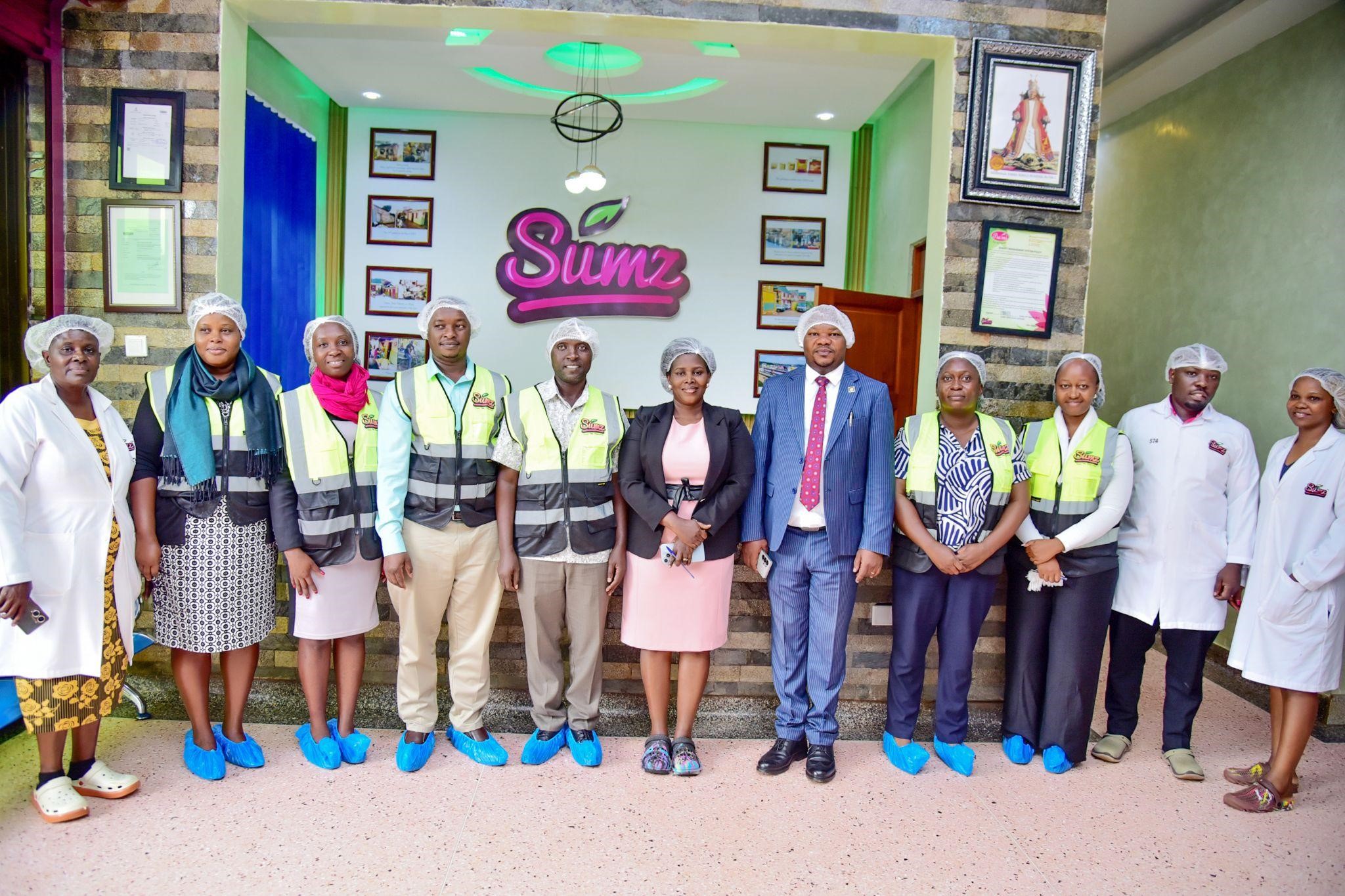
On 2nd March, 2026, representatives from the Advancement Office, the College of Business and Management Sciences and the University Innovation Pod visited Psalms Food Industries to discuss a prospective partnership aimed at strengthening university–industry collaboration in manufacturing, research, innovation, and skills development.
Psalms Food Industries, a homegrown snacks innovation and manufacturing company, operates three major brands, namely, Sumz, Afrikan Harvest and Krunchables, which have grown to a range of 37 products and target the introduction of five new products annually. The company distributes products across Kenya, Rwanda, the Democratic Republic of Congo, South Sudan, and, recently, Tanzania. As a labour of love, the idea of producing snacks was born during the honeymoon of Mr and Mrs Ngabirano, who now run Psalms Food Industries side by side.
Dr. Denis Ngabirano, CEO and Co-Founder of Psalms Food Industries, during the meeting, described the company as “a snacks innovation house, with all our products developed in-house.” He noted.
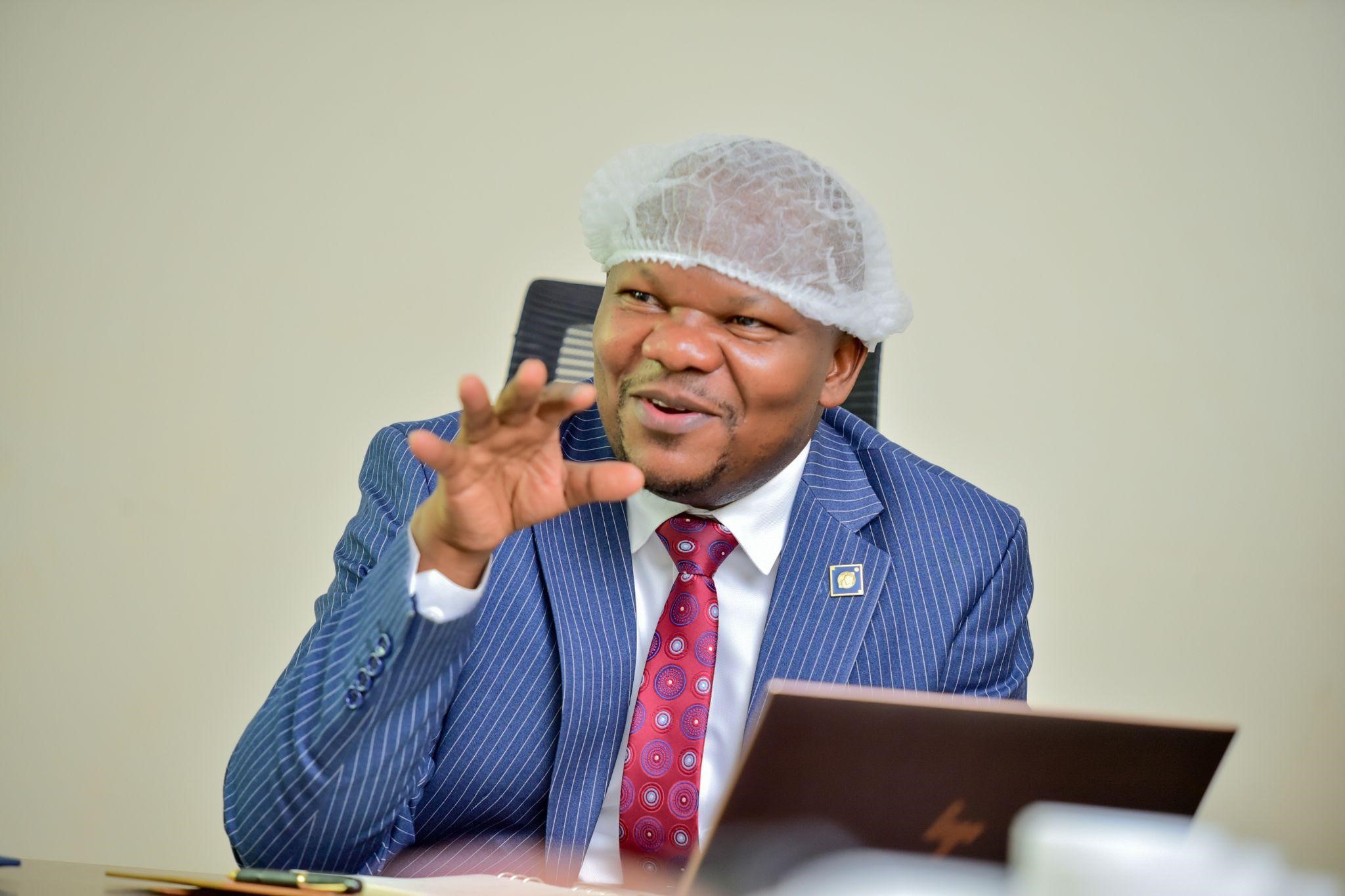
He emphasised the company’s commitment to quality assurance and consumer-centred research, noting that Psalms conducts surveys and gathers customer feedback to inform product development, supported by an internal microbiology and chemistry laboratory.
Dr. Denis Ngabirano noted that the company had only recently introduced two brands, “Afrikan Harvest for it’s health conscious clientele and Kruchables for it’s volume centric clientele.
“Afrikan Harvest has no additives, it is a brand for health-focused consumers,” he explained, while highlighting the differentiated positioning of their product lines. “Sumz is our premium brand, and Krunchables focuses on volume.”
Student-Centered Experiential Learning
A key focus of the meeting was structured experiential learning for students across disciplines. Potential areas of collaboration include internships, graduate trainee pathways, and hands-on exposure within Psalms’ incubation and production facilities.
The proposed engagement spans multiple fields, including environmental sciences, engineering, procurement and logistics, finance and accounting, quality control, production and manufacturing, human resource management, marketing, and international business.
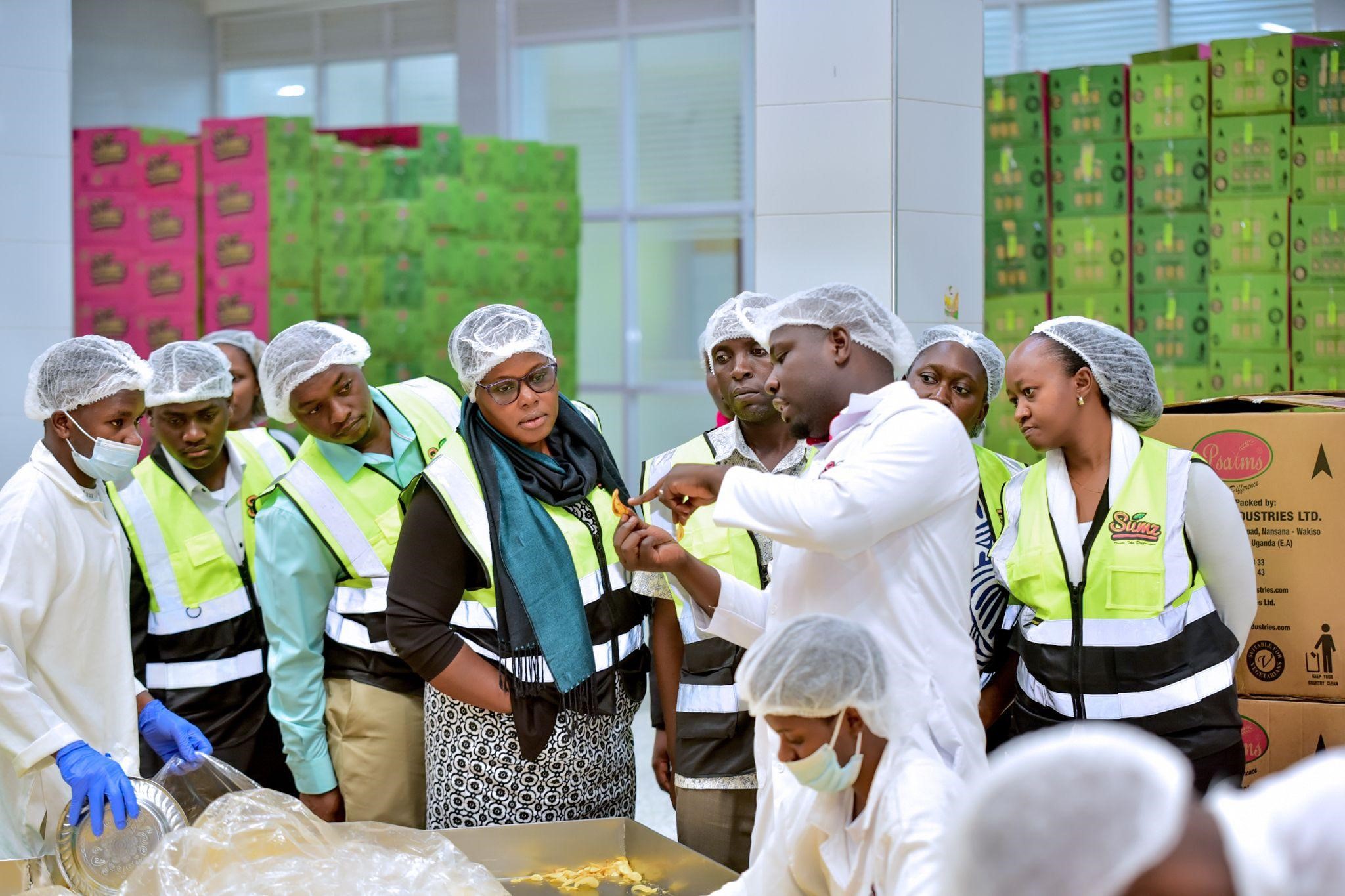
The partnership could provide students with direct exposure to real-time production systems, standard operating procedures (SOPs), and quality assurance frameworks, strengthening the practical relevance of their academic training.
Among the innovative ideas discussed was a potential competition involving students from the Fine Art and Industrial Design disciplines to redesign packaging for selected Sumz products. The proposal would allow top designs to be commercially adopted, creating a direct bridge between creativity, intellectual property development, and industrial application.
Research, Innovation and Commercialisation
Both institutions expressed interest in joint applied research initiatives, particularly in process optimisation, data analytics for manufacturing efficiency, product improvement, and sustainable production systems.
Opportunities were also discussed around collaborative research in machine design, crop development for snack processing, and factory energy solutions, areas that not only benefit Psalms but have broader implications for Uganda’s manufacturing sector.
The engagement further highlighted potential linkages with the University’s innovation and commercialisation structures, including the University Innovation Pod (UNIPOD), to support co-creation and scaling of student-led innovations.
Mr Awel Uwihanganye, Chief Advancement Officer at Makerere University, proposed strengthening the engagement through structured programming, including a planned collaboration between the University’s innovation Hub and the upcoming incubation Hub at Psalms Food Industries, particularly to support the commercialisation of research outcomes for both students and staff.
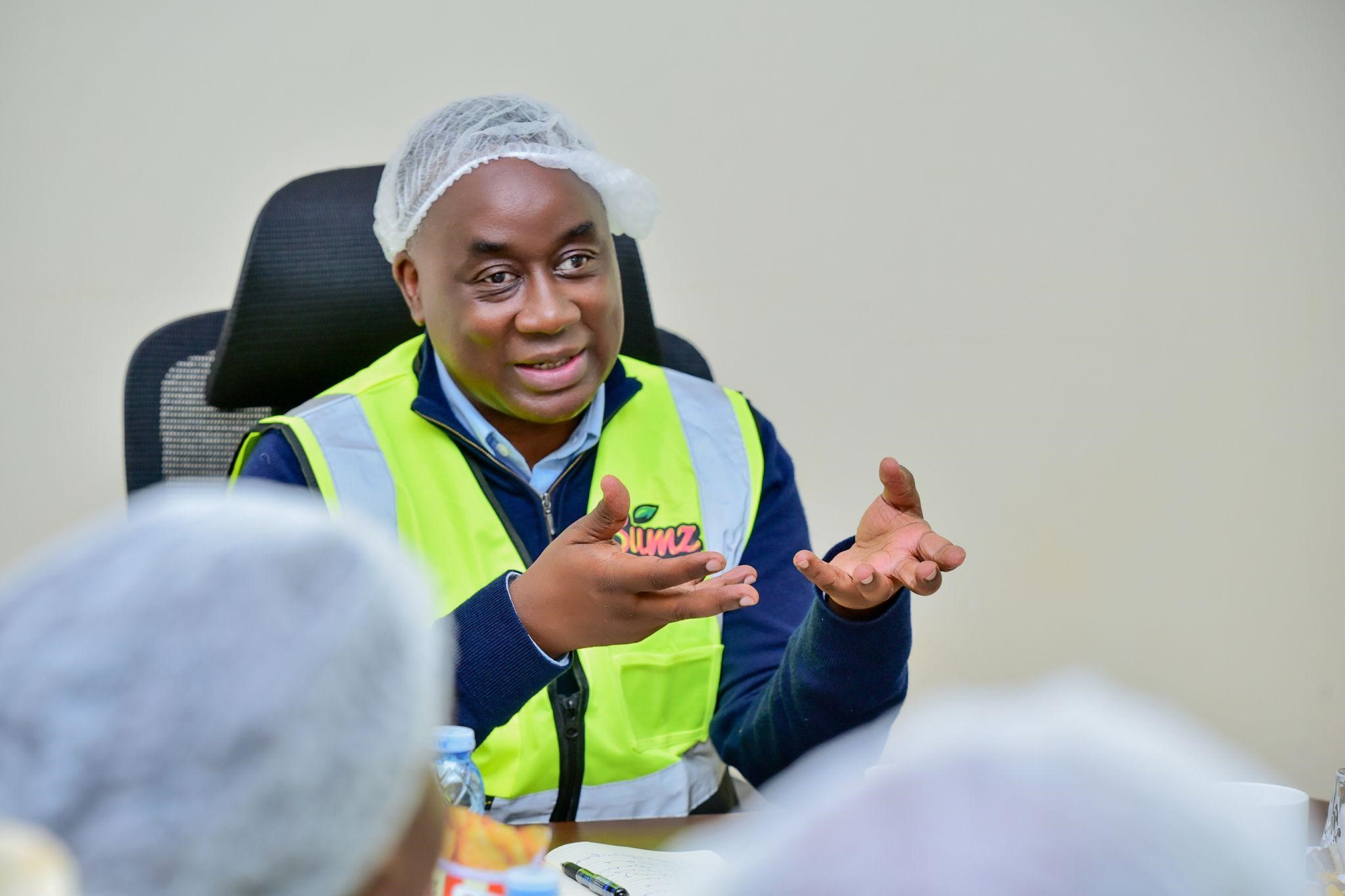
Curriculum Co-Creation and Staff Exchange
Beyond student placements, discussions also focused on co-developing academic content that responds more directly to industry needs, particularly within the manufacturing value chain.
Proposals included guest lectures by industry practitioners, staff exchange programmes to expose academic staff to factory operations, and tailored short courses for Psalms staff based on identified skills gaps.
Dr. Jude Mugarura, Head of the Department of Marketing and Management at COBAMS, emphasised the importance of embedding the partnership within academic programming. He proposed “internships for students in HR, marketing, international business, accounting and finance,” as well as staff exchanges to give University staff hands-on exposure to manufacturing operations.
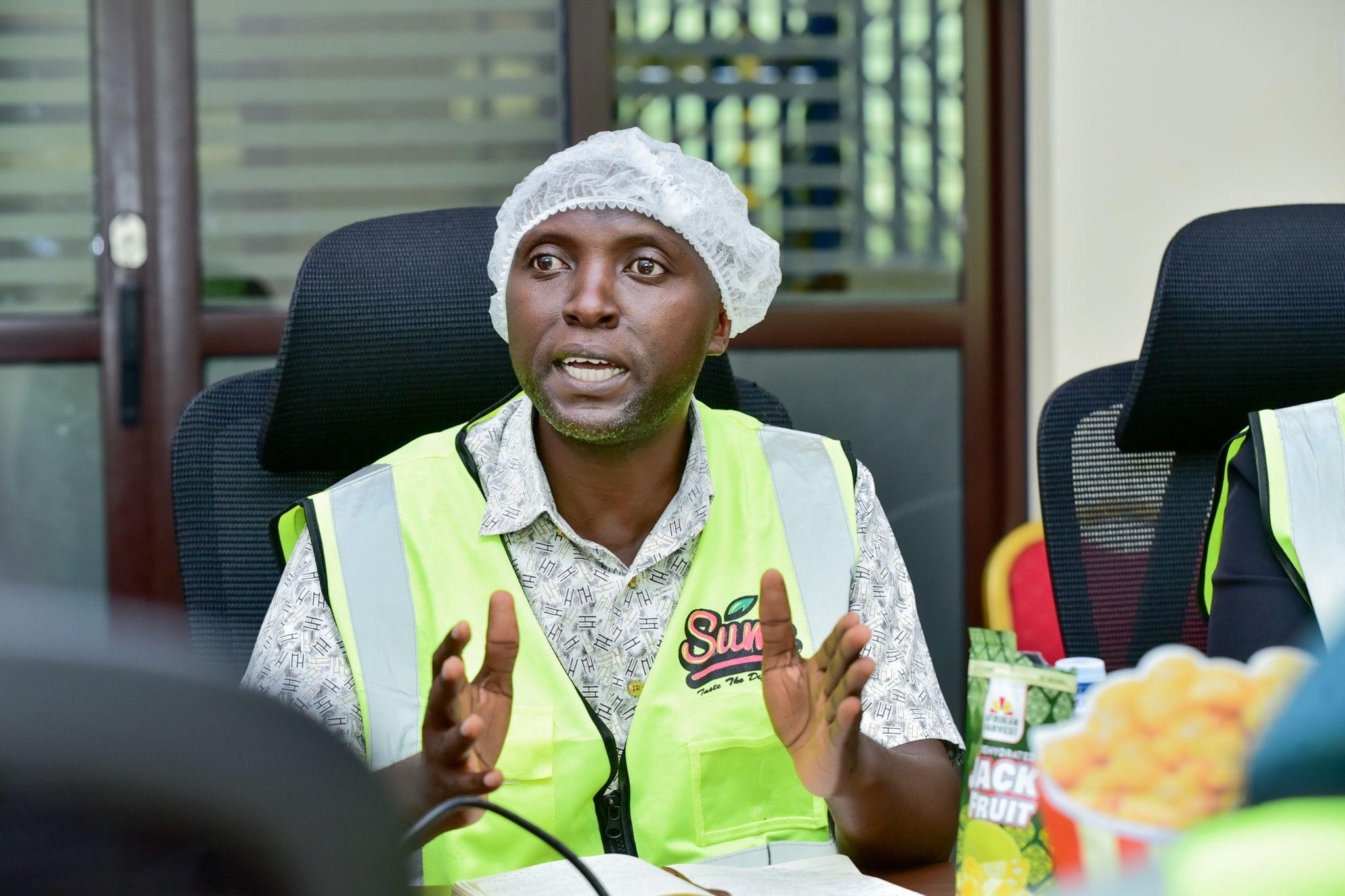
He further suggested specialised courses tailored to the factory’s needs and attachment of research students interested in manufacturing. Such collaboration would contribute to curriculum responsiveness and ensure that graduates are equipped with market-relevant competencies.
Strengthening University–Industry Linkages
The engagement reflects Makerere University’s continued commitment to strengthening partnerships that bridge knowledge generation and real-sector application.
Both institutions expressed a shared vision of building a structured, mutually beneficial collaboration that integrates research, innovation, skills development, and enterprise growth, positioning the University as a key knowledge partner in Uganda’s manufacturing transformation.
Discussions remain ongoing as both parties refine priority areas for formalisation.
Caroline Kainomugisha is the Communications Officer, Advancement Office.
General
Makerere University commemorates 13 transformative years of partnership with Mastercard Foundation
Published
3 days agoon
March 2, 2026
On Friday, 27th February 2026, Makerere University proudly celebrated 13 years of a significant partnership with the Mastercard Foundation, a prestigious independent organisation headquartered in Toronto, Canada. Since its inception in 2013 with the launch of the Scholars Program-currently headed by Prof. Justine Namaalwa, this collaboration has grown significantly, expanding to include two additional initiatives: The E-learning Initiative-headed by Prof. Paul Muyinda Birevu and the Africa Climate Collaborative-headed by Prof. Gorretie Nabanoga. This long-term partnership underscores the shared commitment to fostering education, innovation, and sustainability in Uganda and across Africa.
The colourful event coincided with the 76th Graduation Ceremony, during which Makerere University honoured Ms. Reeta Roy, the Founding President and CEO of the Mastercard Foundation, with an honorary Doctor of Laws.

In her commencement speech, Ms. Roy thanked Makerere University for considering a partnership with the Mastercard Foundation and for conferring upon her a prestigious honorary award.
“Mastercard Foundation is honoured to collaborate with this esteemed university, and I appreciate the recognition through this award. I am excited to be associated with Makerere University and look forward to actively embodying its values. Joining the broader community of alumni from this distinguished institution is a privilege, and I am eager to contribute to its legacy,” stated Ms. Roy.

During the reception in honour of Ms. Roy, the Chairperson of Makerere University Council, Dr. Lorna Magara, acknowledged the invaluable support from the Mastercard Foundation. She emphasised the profound impact of the Foundation’s various initiatives, particularly the scholarships for disadvantaged youth, which enable them to access higher education and opportunities that might have otherwise been beyond their reach.
“On behalf of the Makerere University Council and the broader University community, I extend our sincere gratitude to Mastercard Foundation for its commitment to collaborating with Makerere University in various endeavours, especially for providing scholarships to our underprivileged young people who would never have stepped inside a lecture room at the University.” Dr. Magara stated.

Dr. Magara, in a special way, thanked Ms. Roy for her transformative leadership and unwavering commitment to supporting young people in Africa, citing her efforts to ensure young people get their voices heard.
“As a university, our business is with young people. We are therefore committed to providing the environment and education that deliver meaningful pathways. We will provide an environment that ensures young people have a voice and agency to create meaningful change in society.” Dr. Magara pledged.

Dr. Magara further congratulated Ms. Roy on her honorary Doctor of Laws from Makerere University, noting that it is the university’s highest honour for individuals who have excelled in their careers.
“On behalf of the Makerere University community, I would like to extend my heartfelt congratulations on your honorary Doctor of Laws. This esteemed recognition represents the highest honour our institution can bestow on individuals who have demonstrated exceptional achievement and excellence across various facets of their career.” Dr. Magara remarked.
Prof. Justine Namaalwa, the Program Director of the Mastercard Foundation Scholars Program and the Coordinator for all Mastercard Foundation Initiatives at Makerere University, expressed her appreciation for the thirteen-year collaboration between Makerere University and the Mastercard Foundation. She highlighted that the partnership had yielded significant, impactful results.

“In 2013, Makerere University partnered with the Mastercard Foundation to educate the next generation of transformative African leaders who can positively impact their lives, their communities, and the economies of Africa. The partnership has had a significant impact. I thank the University Management and the Foundation team for this visionary collaboration,” remarked Prof. Namaalwa.
Prof. Namaalwa articulated that the partnership with the Mastercard Foundation is primarily focused on empowering young people as agents of change for transformational leadership in Africa. She presented compelling statistics demonstrating the positive impact of the scholars’ program, highlighting the success of individuals who have completed their education and their subsequent professional experiences after university graduation.

“This partnership focuses on young people, aiming to create positive change in their lives. To date, the Scholars Program has graduated 974 alumni, with 48% securing formal employment, 18% starting their own businesses, 8% participating in internships, and 5% pursuing further education. Overall, 72% of Scholar alumni are actively engaged in employment or entrepreneurship,” Prof. Namaalwa stated.
The colourful event showcased a dynamic array of activities that highlighted the entrepreneurial spirit of Scholars and alumni from the Mastercard Foundation at Makerere University. Attendees enjoyed a mini-exhibition featuring innovative products from these ventures.

A video documentary illustrated the positive impact of the three Mastercard Foundation initiatives. The event also featured inspiring poetry recitations by Scholars and a lively atmosphere of music and dance, creating an engaging and memorable experience for all participants.
The high-level event was attended by senior University officials, led by the Chairperson of Council, Dr. Lorna Magara; the Vice-Chancellor, Prof. Barnabas Nawangwe; the Vice-Chancellor, Academic Affairs, Prof. Sarah Ssali, Deputy, and the Ag. Deputy Vice-Chancellor, Finance and Administration Prof. Winston Tumps Ireeta. Mr Yusuf Kiranda, the University Secretary; and Prof. Buyinza Mukadasi, the Academic Registrar, Chancellor Emeritus-Prof. Ezra Suruma, former Chairperson of the Steering Committee of Mastercard Foundation Scholars Program-Prof. Umar Kakumba, and the Deputy Executive Secretary, RUFORUM, and former Program Coordinator of the Scholars Program at Makerere University-Dr. Florence Nakayiwa, among many other officials graced the function.

The event was also graced by a high-level delegation from the Mastercard Foundation, led by Ms. Reeta Roy, the Founding President of the Foundation, and included the Mastercard Foundation Teams from the Country offices in Kigali, Nairobi, and Kampala; the Program partners; the Mentors, Scholars and alumni; as well as the Program staff of the three Mastercard Foundation Initiatives at Makerere University.
At the end of the event, Makerere University honoured Ms. Reeta Roy with University memorabilia, including a pencil-drawn portrait, a pencil-drawn photo of the Ivory Tower, and other Ugandan crafts. Ms. Roy cut a graduation cake together with the 10 graduates of the 76th graduation ceremony from the Mastercard Foundation Scholars Program.
Bernard Buteera is the Principal Public Relations Officer for the Mastercard Foundation Scholars Program at Makerere University.

It is with great pleasure that I welcome you to this edition of Mak News Magazine, a publication that continues to chronicle Makerere University’s journey as a centre of academic excellence, innovation, and societal transformation.
The stories featured in this issue vividly demonstrate Makerere’s unwavering commitment to addressing national, regional, and global challenges through research, partnerships, and people-centred solutions. They reflect a university that is deeply engaged with society, one that applies knowledge not only to advance scholarship, but also to improve lives.
A recurring theme in this edition is innovation for resilience and inclusion. From the College of Agricultural and Environmental Sciences’ Healthy Soy Initiative combating child malnutrition amid climate change, to the cutting-edge work of CEDAT’s Team Green Minds integrating IoT into agriculture, Makerere continues to harness science and technology to respond to pressing development needs. Equally inspiring is the College of Natural Sciences’ success in securing international funding to scale up fish processing technologies, with a deliberate focus on empowering women and strengthening livelihoods.
This issue also highlights Makerere’s growing role in advancing health and wellbeing. The launch of the Early Intervention Psychiatry Services Clinic at Makerere University Hospital marks an important step in strengthening mental health services, while the Hospital’s transformation from a modest sickbay into a centre of excellence stands as a testament to decades of strategic investment, dedication, and service to the nation.
Our commitment to education access and global engagement is equally evident. Strategic partnerships, such as that between the College of Education and External Studies and the Uganda Vocational and Technical Assessment Board, are expanding pathways to quality education. The establishment of the first-ever United States Studies Centre in the Great Lakes Region positions Makerere as a hub for dialogue, research, and policy engagement on global affairs. We also celebrate our vibrant international community, with graduates drawn from 67 nationalities—affirming Makerere’s status as a truly global university.
This edition further showcases initiatives that ensure long-term institutional sustainability, including the launch of the CoCIS Endowment Fund, infrastructure developments such as the modern hostel at Buyana Farm, and transformative programmes supported by the Mastercard Foundation that continue to empower young people across the continent.
As you read through these pages, I invite you to reflect on the collective effort of our students, staff, alumni, partners, and supporters whose contributions make these achievements possible. Together, we continue to shape Makerere University as a place where knowledge serves humanity.
I wish you an engaging and inspiring read.
Prof. Barnabas Nawangwe
VICE CHANCELLOR
Trending
-

 Humanities & Social Sciences1 week ago
Humanities & Social Sciences1 week agoMeet Najjuka Whitney, The Girl Who Missed Law and Found Her Voice
-

 General1 week ago
General1 week ago76th Graduation Highlights
-

 Agriculture & Environment2 weeks ago
Agriculture & Environment2 weeks agoUganda Martyrs Namugongo Students Turn Organic Waste into Soap in an Innovative School Project on Sustainable Waste Management
-

 Health2 weeks ago
Health2 weeks agoMakerere University School of Public Health Graduates First Cohort of Cost-Effectiveness Analysis Short Course
-

 Agriculture & Environment1 week ago
Agriculture & Environment1 week agoCAES Presents Overall Best Performing Student in the Sciences & a Record 28 PhDs at the 76th Graduation Ceremony
